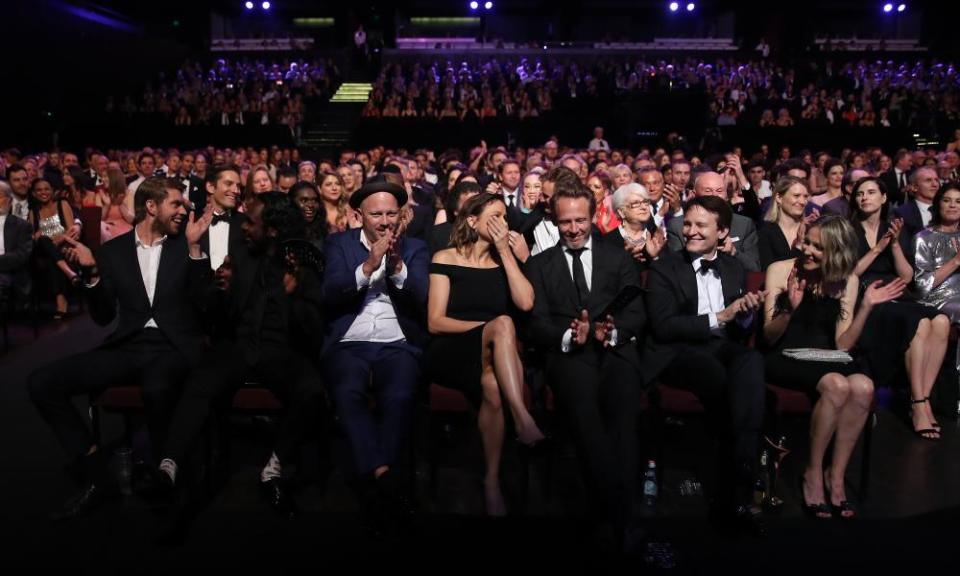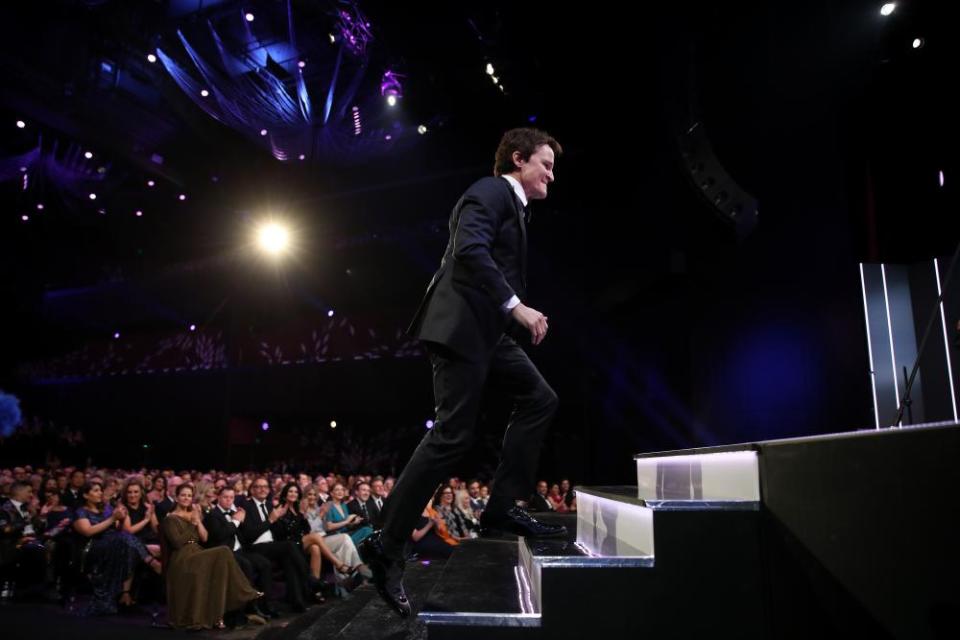Aacta awards 2019: it's strange to be a critic at the ceremony

Lambs of God and The Nightingale were among the big winners at this year’s Aacta awards – the Australian screen industry’s celebration of film and television.
The former – a brooding four-part Foxtel drama about creepy nuns living on a far-flung island – scored a total of eight awards in the TV categories, including best miniseries, best direction (for Jeffrey Walker) and best cinematography (for the veteran sharp eye Donald McAlpine).
Related: Aacta awards 2019 winners: The Nightingale and Total Control dominate Australian screen awards
The Nightingale, the writer-director Jennifer Kent’s elegantly constructed albeit stomach-turning period piece, took six awards, including best film, screenplay and direction. Kent became the first woman in the event’s history to win all three awards for the same film in the same year.
It’s an elegant affair, replete with the things one expects from these sorts of occasions – alcohol, canapes, frocked-up stars and speeches delivered to an audience who are either waiting for their nominated category, or for the after party. Actors who won one of the gold one-armed statuettes included Richard Roxburgh (for The Hunting), Aisling Franciosi (for The Nightingale), Deborah Mailman (for Total Control) and Damon Herriman (for Judy & Punch).
But this year’s ceremony was a little less glamorous than usual: they allowed me in the door. Ordinarily I watch the event on TV or huddle in the Aacta media room – where the winners (or at least the ones who show up; Kent, Franciosi, Roxburgh were all MIA) are brought straight from the podium to discuss their victory with vitamin D-deprived entertainment journos.
But on Wednesday night at Sydney’s Star Casino I observed the Australian film and TV glitterati up close in their natural habitat, breaking my usual rule of avoiding walking down or even looking at a red carpet. It wasn’t all bad: I got to chew the fat with the legendary Father Bob Maguire, who I was chuffed to meet in person.

In terms of winners and losers, the ceremony was a slightly dispiriting experience for me from the start – in that I knew the film I wanted to win had no chance at all. That film was Acute Misfortune, the director Thomas M Wright’s hauntingly poetic biopic of the artist Adam Cullen: very obviously, in my mind, the best Australian feature of the year.
Related: Acute Misfortune first-look review – Adam Cullen biopic is an enthralling, complex triumph
Rather than contending for best feature, however, the film was nominated for “best indie” – a category added to Aactas last year. The results of this category were announced during Monday’s “industry luncheon” event; it lost to another (very fine) production that also should have been nominated for the main prize: the writer-director Rodd Rathjen’s moving Cambodia-set coming-of-age film Buoyancy.
I clapped loudly and enthusiastically when Lambs of God was announced as winner of best miniseries, although I would have preferred if ABC/BBC’s dazzling drama The Cry – in my mind the best Australian TV show of the year – had taken that prize. No matter: those Lambs are wild and the show is excellent – a darkly magical and intoxicating ride, cooked up with a devil’s grin.
I applauded much less enthusiastically when Australian Survivor: Champions v Contenders was announced as winner of best reality show (beating The Block, Married at First Sight, MasterChef and My Kitchen Rules). Partly because I believe, hand on heart, that it would be best for everybody if the reality TV industry were burnt to the ground and its ashes stomped upon – along with Sky News after dark and the entire cinematic works of Nick Giannopoulos.

It is shocking that Aacta gives such prominence to the reality TV category, which was announced near the end, just before best film. Meanwhile, enormously important categories such as cinematography (the visual language of film) and editing (the grammar) aren’t even included in the main, broadcasted event, shafted to the side at the aforementioned luncheon.
Back to the subject of applauding: it’s not hard, is it? You just kind of bang your hands together. But things aren’t so simple when you’re a film and television critic attending an award’s night for film and television shows. Particularly if you’ve criticised, as I have, the work of many people at the event – and even the event itself – at one point or another.
What if I’m caught over-applauding a production I was critical of? What if I under-applaud one I love? What if the TV feed crosses to me and captures a physical response that’s inconsistent with my written verdict? There is a word for these sort of feelings, and it is “paranoia”. Happily this magically disappeared after a couple of champagnes and arancini balls at the after party.
At one point I was chatting to a woman whose young son is a big fan of Charlie Pickering. When the host of The Weekly walked by, he happily obliged her request to film a video for her child. It was very sweet. Pickering gets the Aacta award for nicest guy at the after party.

 Yahoo Movies
Yahoo Movies 